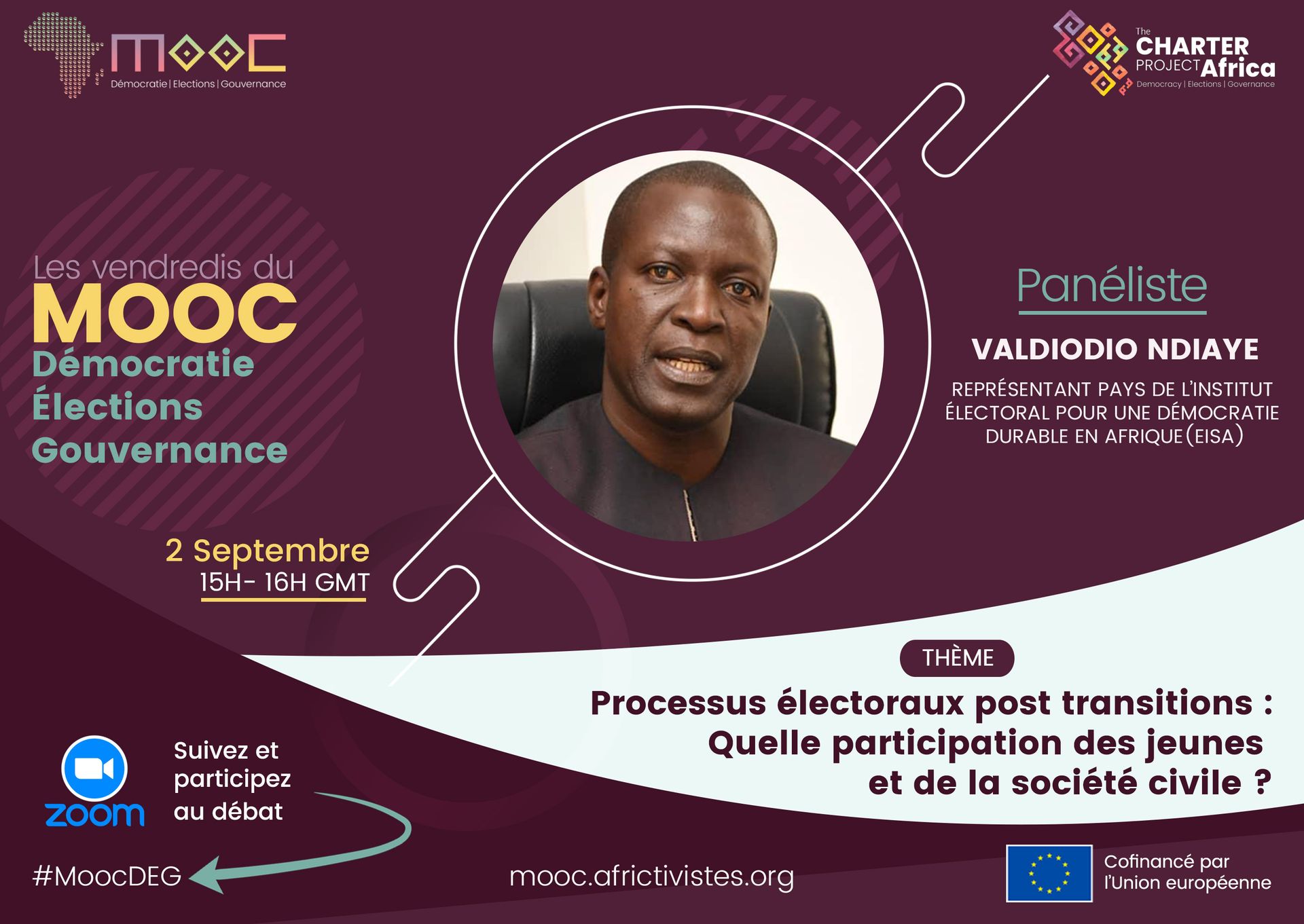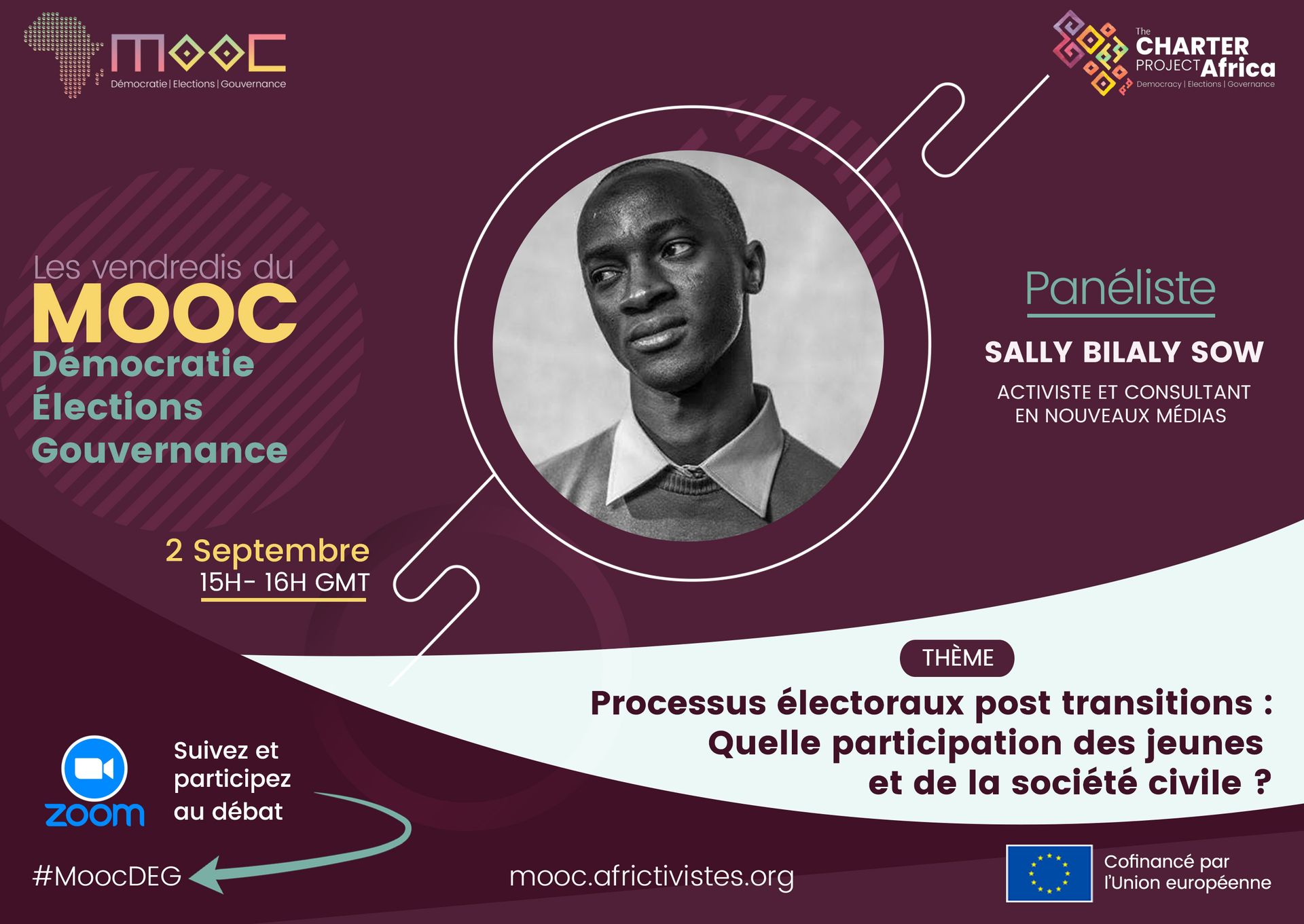“Post-transition electoral processes: what participation of youth and civil society?" This is the theme of the third Friday MOOC series, organised on 2 September 2022 by AfricTivistes. This webinar is part of the educational activities of the Democracy, Elections and Governance in Africa MOOC.
This sensitive and topical subject is unfortunately unique to the continent, more than 60 years after the independence of most states. In the last three years there have been at least five coups d'état in Africa: (2) two in Mali, (1) one in Chad, (1) one in Guinea, (2) two in Sudan and (1) one in Burkina Faso at the time of the session. Not to mention the failed coup in Guinea Bissau. It should be noted that after this webinar, a new coup d'état was unfortunately carried out in Burkina Faso where the transitional government led by Lieutenant Colonel Paul Henry Sandaogo Damiba was overthrown by Captain Ibrahima Traoré.
In all the countries where coups d'état have taken place, military juntas have come to power and most of the time promise transitions that are contested by sub-regional organisations such as ECOWAS, CEMAC and more broadly the AU.
Meanwhile, there are many situations that testify to the shrinking of civic spaces in a context where young people are demanding more and more freedom and expressing their opinions strongly. The panellists spoke at length on the subject, but did not fail to put forward solutions for greater involvement of young people in political affairs.
This webinar was delivered by :
Valdiodio Ndiaye, Représentant Pays de l’Institut Électoral pour une Démocratie Durable en Afrique (EISA),
Nerima Wako-Ojiwa, Executive Director of Siasa Place.
Sally Bilaly Sow, Web Activist and New Media Consultant,
VALDIODIO NDIAYE, EISA REPRESENTATIVE IN MADAGASCAR

"In many countries, there is a certain opacity around the transition"
"First of all, it should be made clear that we are talking about a political transition and that is characterised by a change resulting from one or more events. Today, political transitions often underlie a constitutional transition. (...) Since the beginning of the 2020s, the African continent has experienced three abrupt interruptions of the constitutional order. And West Africa (Guinea Conakry, Mali, Burkina Faso) is very much affected but also East and Central Africa (Sudan and Chad). Overall, there is a lack of visibility and clarity on where we want to go. In Guinea, the transition period was initially 39 months. Then it was extended. The same goes for Burkina Faso and Sudan, where it is a blurry. For Chad, it's the same thing, no visibility on the situation. In Mali, a new transition has been set up that should last until 2024. A very simple analysis shows that the discussions have not benefited Mali. There was a lot of consultation and we are talking about a new constitution. (....)
It should also be noted that the African Union (AU) has a strategy of anticipating unconstitutional changes. The African Charter for Democracy, Elections and Governance (ACDEG) has been clear on this point and strongly condemns any disruption of the constitutional order. And if there was a rigorous application of this charter, the situation would have changed. It is a pity that there are still countries on the continent that have not ratified this charter. Even Senegal has not yet done so. If it were applied objectively, I think we would have gone beyond that phase. This shows that the instruments can be quite revolutionary, but their enforcement is problematic. And this is where African civil society organisations must act. They must organise themselves more to put pressure on the states and reverse this trend. We must also acknowledge that the AU must be thoroughly reformed because the presence of heads of state at the decision-making level is such that, whether we like it or not, decisions are slowed down excessively. This makes it very difficult to implement this charter.
We therefore need to work on a process that consists of federating the active African forces. Activism is also an excellent way of trying to bring states into line with democratic principles. In addition to denunciation, we need to make counter-proposals. Today, we realise that in many countries in transition, there is a degree of opacity.
However, in Guinea for example, where I am familiar with civil society, there are skills capable of designing very technical proposals and promoting them through demonstrations, debates, etc. At the African level, CSOs should be able to propose a constitution, an electoral code, and even make extremely specific proposals on the electoral cycle. If I take the example of Senegal, the Autonomous National Electoral Commission (Cena) was forced to call on young people to manage the ICT dimension. That is why in Burkina, young people must fight to be in the electoral commissions.
So, young people must get involved. Thus, we must develop an approach to electoral civic education. The electoral civil society must educate people so that they take action without waiting for funding from organisations or other partners. It is from there that we can have a legitimisation of future leaders. Subsequently, work on election observation among other aspects that can be important in the process. Involvement in the activities must be strong. We must not leave the space to the political parties who are in the business of interest. (...)"
NERIMA WAKO OJIWA, DIRECTRICE EXÉCUTIVE DE SIASA PLACE

"Young people do not trust the institutions in charge of elections"
"We created the SIASA PLACE organization because we felt that too few young people were in the right spaces, having the right conversations, and having an impact when it came to politics. Politics affects everything from the price of food to the type of education or opportunities. And that's what we're trying to get across to young people.
In our work, we help the Kenyan electoral commission reach out to young people, communicate with them and encourage them to register and participate. In the last presidential election in the country, the youth did not register en masse. When we talk about the numbers, it was 38.9%. A drop from 2017, which was slightly over 50%. This is a trend we're going to see in our countries in terms of participation. We're going to see a decline, particularly in the number of young women.
To the question of why young people are not interested in politics, it should be said that they do not trust the institutions in charge of elections because they do not consider them to be independent. They often say, and I quote, "why wait in line to vote when they have already decided the winner? ". Secondly, it should be noted that for young people, voting is not considered a responsibility. For this generation, it is a choice. So they choose not to get involved. (...)
However, there are countries that are making efforts to reverse this trend. In Kenya, in order to interest young people in particular, the political party registration office has an online registration platform. Because the observation is that young people are a minority in the parties. So they need to understand that influence comes from participation. In Zambia, we have seen an increase in youth participation in elections because of the ability to register online. We need to start thinking about the future of engagement. Especially since today's youth want something quick, easy and clear.
In addition, regarding social media engagement, the first thing to note is that there is often a lot of misinformation related to elections. This is a challenge today. We need to combat the rise of propaganda and deep misinformation."
SALLY BILALY SOW, WEB ACTIVIST AND NEW MEDIA CONSULTANT

" Youth has a great role to play and must be at the forefront of this struggle".
"We, as young people and members of Guinean civil society, have no clarity on the transition. All the hopes we had have turned into a nightmare. In the aftermath of the coup d'état (5 September 2021), there was optimism even if some people kept their distance from the start. There is a section of civil society that has been trying to put pressure on since the beginning of the transition.
What we can say today is that there is no real will to establish dialogue on the part of the transitional authorities. Even if there are regional, sub-regional and even continental mediation initiatives. The junta in power is developing an unstated ambition.
Guinean civil society must participate in the dialogue process. But it must also take action to monitor the transition.
There is a strong demand to redress the transition. And the youth have a big role to play and are at the forefront of this struggle. Seven young Guineans lost their lives during the demonstrations against the ruling junta. The work is being done by organisations like the National Front for the Defense of the Constitution (FNDC). Currently young activists are in hiding for having dared to ask for a redirection of the transition and for more transparency.
About thirty participants attended the webinar which was very interactive and which shows once again that the debate on the politicisation of young people deserves to be maintained.We are looking forward to a new webinar on another topic covered in the MOOC Democracy, Elections and Governance in Africa.
Par Seydina Bilal DIALLO et Abdou Aziz CISSE translated by Aisha DABO